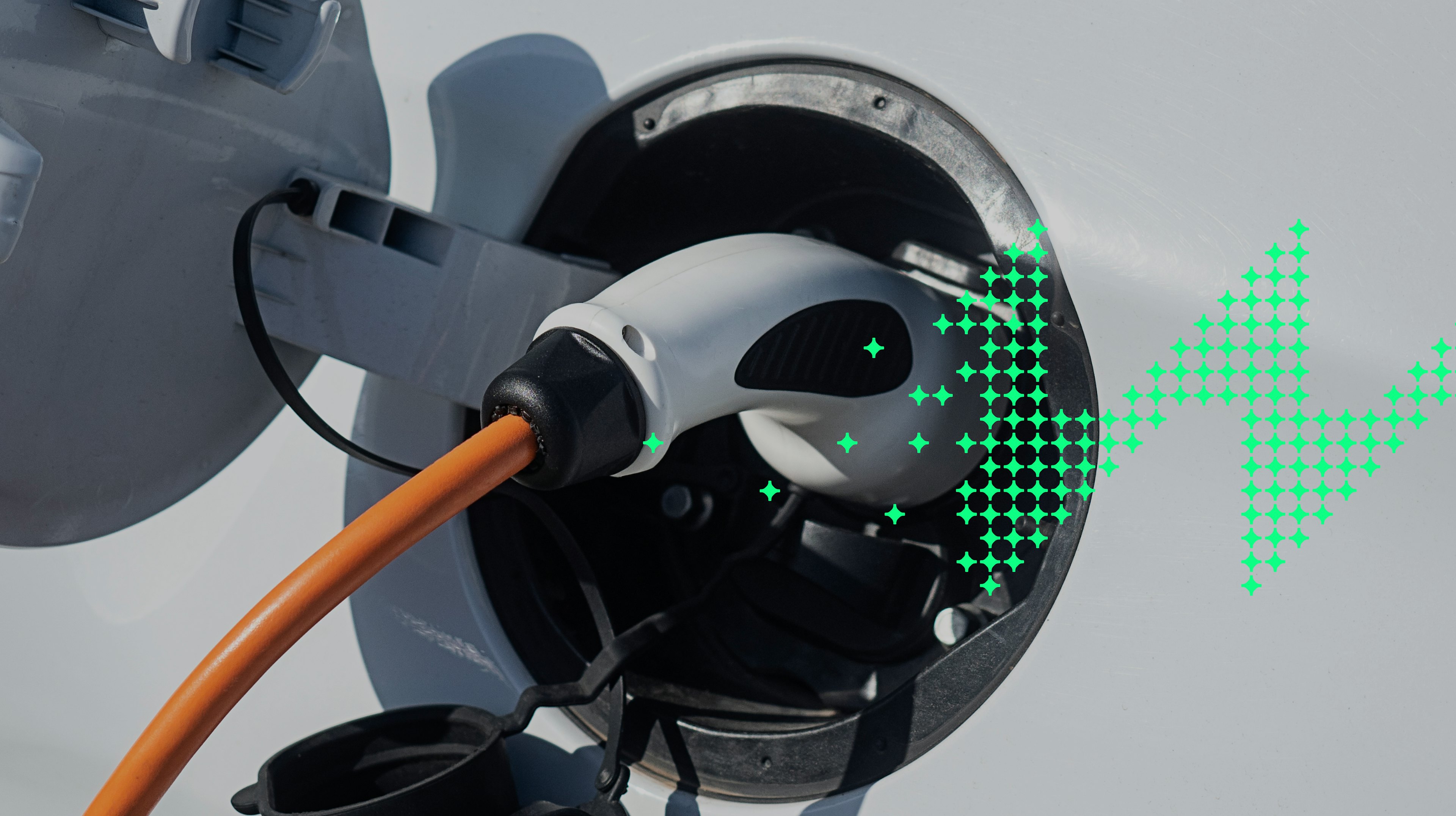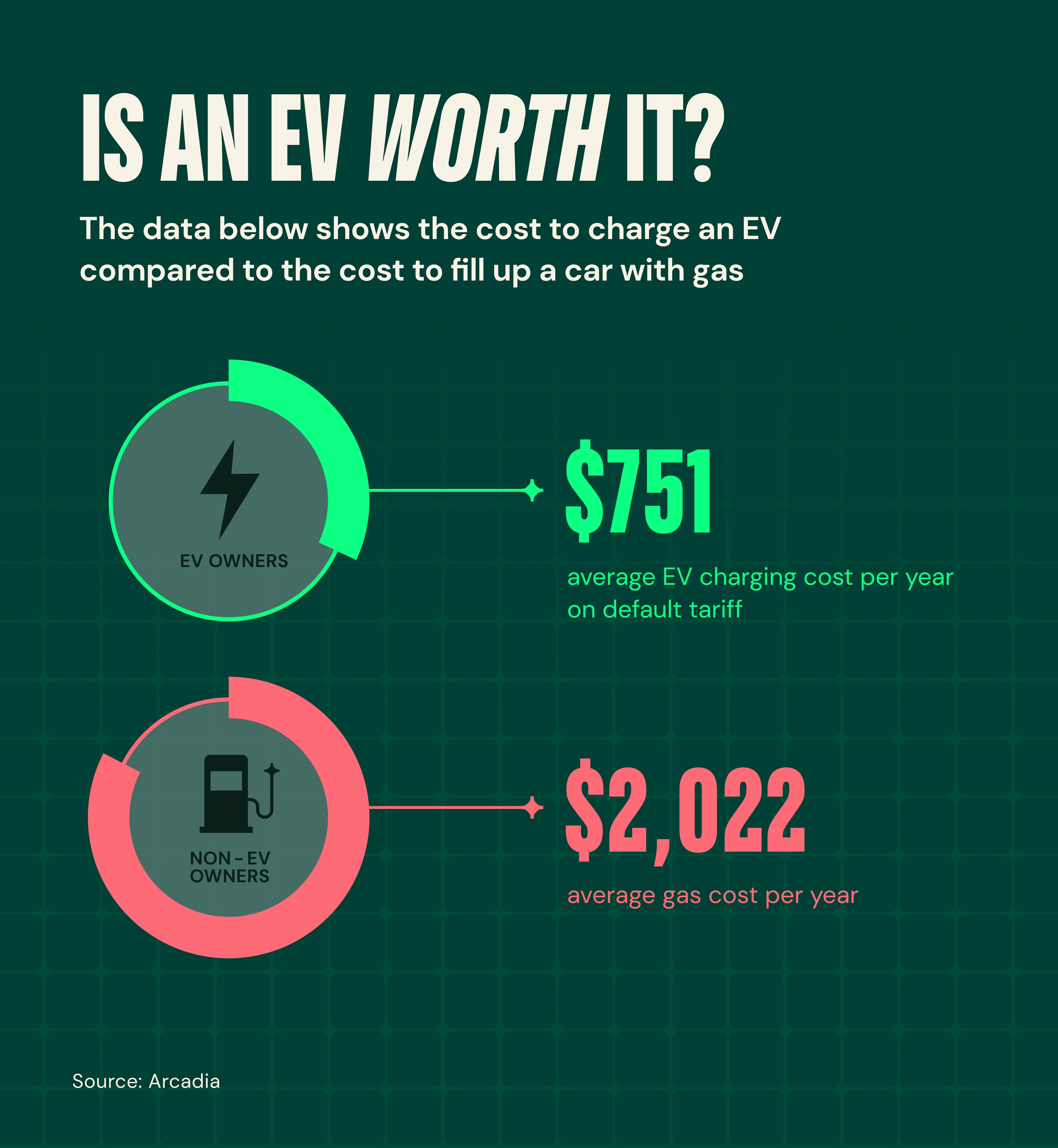Six frequently asked questions about owning an EV

One in four drivers report that they’re considering an electric vehicle (EV) for their next car.* Given that transportation is the top source of greenhouse gasses in the US, that’s pretty cool. But many prospective EV owners still have a lot of questions, especially around charging — how do you manage EV charging? When do you charge? How much does it cost? Is it actually cheaper than gas?
If you’ve been asking some of those questions, we’ve got you. We’re tackling frequently asked questions about owning an EV with the help of a survey that Morning Consult conducted for Arcadia of 600 current EV owners.
Question 1: Do EV owners actually like their EVs?
Yes! The overwhelming majority of EV owners report being very satisfied (51%) or somewhat satisfied (43%) with their vehicles, and a whopping 96% say that they definitely or probably will buy an EV as their next vehicle.
Question 2: Where do people charge their EVs?
Most EV owners (72%) charge at home most or all of the time. As Joe, a senior software engineer at Arcadia puts it, “Charging at home is the most convenient.” Charging at home gives drivers the greatest flexibility to charge in a way that suits their lifestyles, whether that means charging as soon as they get home or delaying their charge to later in the day. Plus, it’s often less expensive than charging in public. Joseph, an Arcadia security engineer, said that he charges at home because “public charging is not really worth the cost.” Among survey respondents, 41% agree that charging at a public station is too expensive.
Question 3: How often do people charge their EVs?
It depends, but 33% of survey respondents charge their vehicles daily. Another third (34%) charge several times a week.
Question 4: How does the cost to charge an EV compare to the cost to fill up a car with gas?
To put this question another way, are EVs actually worth it? We ran the numbers at the end of last year (so before gas prices spiked). Using our tariff database and electricity cost APIs, we calculated how much it would cost to charge an EV in 15 major metropolitan areas across the country. We looked at two scenarios — using the default tariff and using the optimized tariff — and compared the cost to the average local cost of gas.

The results? Across all 15 markets, EV owners would pay an average of $751 a year to charge their vehicles on the default tariff, versus $2,022 in average annual gas costs. That’s an average savings of 63% on overall fuel costs. Optimized charging (on the best tariff and charging at the lowest-cost time) can help even more. EV owners would save an average of 78% from gas costs with optimized charging — 33% more than their savings on the default tariff discussed above.
That’s certainly been the experience for some of the EV owners at Arcadia. Joseph uses his plug-in hybrid primarily for getting around town. He reports, “The gas savings are substantial since ‘around town’ stop-and-go driving is by far the most fuel-inefficient for an [internal combustion] vehicle.” Joe agrees. “My costs are significantly lower,” he says. It costs about $6 to fully charge his EV, which works out to $2-4 per 100 miles. His previous gas vehicle got about 44 mpg, which would be $9 or more per 100 miles.
Question 5: Do EV drivers have to make any adjustments at home to be able to charge their vehicles?
It depends. Among survey respondents, 59% have installed Level 2 chargers for their EVs at home. Level 2 chargers run 208-240 volts and charge EVs faster than plugging them into standard electrical outlets. But they often require drivers to install higher-voltage panels. That was the case for both Joe and Jon, a product manager at Arcadia. They had to run a larger electrical circuit to the garage and/or install higher-voltage panels to support their Level 2 chargers.
But on the other hand, neither Joseph nor Ryan, a staff backend engineer on the Arcadia team, have made any adjustments. They either use a regular outlet or the Level 1 charger that came with their EV, and it’s been working for them!
Question 6: What improvements would drivers like to see in the EV charging experience?
To go back to the previous question, Joseph would like to see an updated code provision for new construction homes that require a 240-volt outlet to be available in the garage, in anticipation of EV charging, as well as more federal incentives for homeowners to add 240-volt outlets to their existing charging space.
Jon would like an app that automatically charges his EV at the cheapest time and sends him a push notification if it’s going to delay charging. That way he won’t think anything is broken if he plugs his EV in and it doesn’t start charging right away. The majority of survey respondents would like to see something similar — 93% indicated that they would definitely or probably use a solution that helped them manage and optimize their charging so that they could charge when energy was cheapest and cleanest.

Explore more of the latest EV insights in our report, "What Drivers Want From the EV Charging Experience"
Download*National survey of 2,291 US adults conducted by Morning Consult for Arcadia
Join our newsletter
Stay updated with our latest insights, industry trends, and expert tips delivered straight to your inbox


